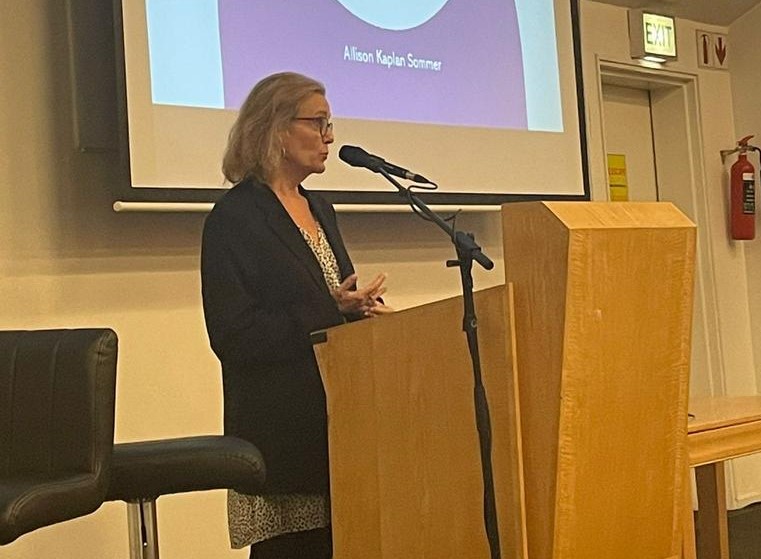click to dowload our latest edition
CLICK HERE TO SUBSCRIBE TO OUR NEWSLETTER


Published
9 months agoon
Seasoned Israeli journalist Allison Kaplan Sommer says the November 2022 election campaigns of Likud and other right-wing Israeli political parties didn’t allude to judicial reform, and the determination and speed of the coalition to entrench judicial reform has caught many observers by surprise.
It has also led many of these parties’ voters to have second thoughts about who they put into power. “Israelis aren’t stupid, and they’re less than thrilled at the coalition’s attempt at judicial reform. If an election was held today, the current coalition would get 53 seats, not its current 64 seats in the Knesset,” she told a large audience at Limmud in Cape Town. “And the opposition would get 62 or 63 seats.”
“How did we get here?” she asked rhetorically about the political turmoil in Israel. Ultimately, she said the longest-serving Israeli prime minister, Benjamin “Bibi” Netanyahu, brought himself back to the political stage to form the most extreme right-wing government in Israeli history. This was only possible because Bibi “put a kosher stamp” on parties that were previously seen as anathema to the Israeli electorate because of their extreme views.
Coalition parties have aligned because they all want judicial reform, but for different reasons, Kaplan Sommer said. For Netanyahu, it’s to stay out of jail; for the settlement parties it’s to annex the West Bank; and for the religious parties, it’s to avoid conscription and for Israel to become more theocratic. The fallout of the proposed judicial reform has been swift: thousands protesting; economic instability; possible withdrawal of foreign investment; and reservists threatening not to serve, with an impact on the security of the Jewish state. “How could Netanyahu, the father of the start-up nation and the king of security, allow this?” asked Kaplan Sommer.
Many commentators feel that this “new” Bibi is now making decisions based only on his own political and personal survival, she said. “He no longer cares about America’s sentiments or the future of the nation. It’s harsh, but it looks like that’s what happening,” she said.
However, she pointed out that Bibi now may be “in over his head”, and instead of getting the coalition parties to dance to his tune, he now must dance to theirs. By bringing these parties in from the political wilderness, he also gave them access to power that they don’t want to give up in a hurry. This is another reason for them to push for judicial reform.
According to the The New York Times, “Prime Minister Benjamin Netanyahu of Israel is the face of his government’s effort to reduce judicial power. His justice minister, Yariv Levin, is the main architect.” Kaplan Sommer explains that Levin is determined to make the Knesset into more of a “high school student council” system – just like at high school, when the student council gets voted in and has all the power and there are no “pesky checks and balances”. Levin calls this “pure democracy”.
However, all of this could blow up in the face of the coalition. If the judicial overhaul measures are passed, they will give the Israeli government unforeseen power. And if the left comes roaring back with success in the next elections, the right could find itself more powerless than ever before.
What could stop the current trajectory in its tracks? “Normalisation between Israel and Saudi Arabia,” said Kaplan Sommer. Such a success would force the judicial overhaul to take a backseat and boost Israel’s image and economy. She believes United States President Joe Biden may “dangle this in front of Bibi”, offering it to him in return for a halt on judicial reform. In return, he may ask Netanyahu to abandon the current path and his coalition, form a new coalition with centrist parties, and pull Israel back from the brink.
Could this happen? From her experience as a longtime journalist, Kaplan Sommer said, “In Israeli politics, just like in South Africa, you never know what’s around the next corner.”
